That was the year that was .. 2006 quite remarkable .. and what about YOU in 2007?
Dec 23rd, 2006 | By Counterweights Editors | Category: Key Current Issues The usual year-end reflections on the state of the universe have added bite this year. Starting with Canada, the United States, and Mexico, and finally reaching all the way to the United Nations (to say nothing of the still wider eco-sphere), 2006 has seen some remarkable changes. It is probably a good thing that just what the changes mean is far from clear. The strange spell cast by September 11, 2001 in the USA finally seems to have broken. But what lies ahead is more mysterious than ever. Meanwhile, it was also the year of the sadness of Britney Spears in Beverly Hills ; hick Baptists, rural biker gang murders, and home-grown terrorism in Ontario ; and on and on. The counterweights editors have compiled their own eclectic Top 10 list, as all the high and low dramas of the global village unfold.
The usual year-end reflections on the state of the universe have added bite this year. Starting with Canada, the United States, and Mexico, and finally reaching all the way to the United Nations (to say nothing of the still wider eco-sphere), 2006 has seen some remarkable changes. It is probably a good thing that just what the changes mean is far from clear. The strange spell cast by September 11, 2001 in the USA finally seems to have broken. But what lies ahead is more mysterious than ever. Meanwhile, it was also the year of the sadness of Britney Spears in Beverly Hills ; hick Baptists, rural biker gang murders, and home-grown terrorism in Ontario ; and on and on. The counterweights editors have compiled their own eclectic Top 10 list, as all the high and low dramas of the global village unfold.
10. Democracy in North America … year of elections in Canada, Mexico, and USA. Democracy, with particular reference to electoral democracy, is a crucial value that all three sovereign signatories to the North American Free Trade Agreement espouse, in one practical degree or another. And in 2006 there was a general election in Canada on January 23, a presidential election in Mexico on July 2, and a (maybe) unusually significant US congressional or mid-term election on November 7.
 In broad left-right terms Canada went one way (sort of, with a very slender minority government in a fractious Parliament). The US went the other (pretty much, though the current Democratic majority in the Senate is very precarious). And Mexico stayed the same (on the right, though very closely and with much continuing left protest about cheating). To some degree as well, in all three countries left and right still seem almost evenly divided and quite fractious. Electoral democracy nonetheless retains its attractions, compared to all the alternatives. And Canadian federal politicians apparently like elections so much that they might hold another one very soon. (Where’s the Valium again?)
In broad left-right terms Canada went one way (sort of, with a very slender minority government in a fractious Parliament). The US went the other (pretty much, though the current Democratic majority in the Senate is very precarious). And Mexico stayed the same (on the right, though very closely and with much continuing left protest about cheating). To some degree as well, in all three countries left and right still seem almost evenly divided and quite fractious. Electoral democracy nonetheless retains its attractions, compared to all the alternatives. And Canadian federal politicians apparently like elections so much that they might hold another one very soon. (Where’s the Valium again?)
9. Ghost of Harold Innis as hick Baptist on a roll … maybe? The sometimes cryptic old writing of Harold Adams Innis [18941952], whom 1960s communications guru Marshall McLuhan somewhat affectionately called a “hick Baptist” (and who nonetheless gave McLuhan most of the part of his own gospel that actually made sense) started out 2006 on a bit of a roll. About one month after the Canadian federal election, on February 24, Roy MacSkimming published a review of Marginal Man: The Dark Vision of Harold Innis by Alexander John Watson, in “Canada’s national newspaper.” And he declared that “Watson’s biography delivers the gift of a thinker about the human  condition who was also an authentic Canadian prophet. This is surely one of the important books of the year.” (In Canada that is, of course, of course.)
condition who was also an authentic Canadian prophet. This is surely one of the important books of the year.” (In Canada that is, of course, of course.)
Well was it? Watson’s new biography of Innis won some additional attention down the road in 2006 – including an interesting piece in The Tyee just this past September by Crawford Kilian. This ended with: “Harold Innis was ahead of his time 60 years ago. Perhaps we are ready to understand him now, but we won’t know until we listen to him again.” A book does not have to be all that popular to be important in Mr. MacSkimming’s sense, no doubt. The ultimate word, in any case, may go to Harold Innis’s daugther, Ann Innis Dagg, who attended the official launch of Watson’s book in April: “I often wonder,’ she said, how someone coming from a farm background could be so important and could affect so many people.'” There are still no Canadian politicians or other public figures who quote from Harold Innis’s angular writings in their speeches and so forth. Local life would probably be a bit more interesting if there were.
8. Stephen Harper is Time Canada’s Canadian Newsmaker of the Year? One person who could profitably be listening to the nowadays too obscure Canadian economic historian and global communications theorist Harold Innis again is Canada’s new Conservative minority Prime Minister Stephen Harper. A high-minded and vaguely anarchistic free-market economist from an early 20th century family farm background in Southwestern Ontario (who ended his career as president of the American Economic Association) could almost certainly give Mr. Harper better advice than the more recent trendy neo-con ideologues who apparently instructed his youth.
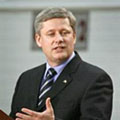 There have been one or two moments since January 23 this year when it almost seemed that Stephen Harper might actually be pondering assorted prophetic texts of Harold Innis (author of, e.g., The Fur Trade in Canada: An Introduction to Canadian Economic History and The Bias of Communication, etc). Innis wanted Canada to be a bolder place than it was in his day and for the most part still is. It does sometimes seem lately that, in the midst of much other confusion, more Canadians are catching up with this bigger thought at last (maybe, somewhat, and so forth). And Mr. Harper actually has briefly tried to practically open up some welcome fresh ground in this broad context, with two still thorny (and surprising) Canadian public policy experiments – his parliamentary resolution on Quebec as a nation within a united Canada, and his new bill on “consultative” elections of Canadian Senators he may or may not get a chance to appoint. Mr. Harper does seem to us wrong about almost everything else. But maybe these two things are enough to make him some kind of Canadian newsmaker of the year.
There have been one or two moments since January 23 this year when it almost seemed that Stephen Harper might actually be pondering assorted prophetic texts of Harold Innis (author of, e.g., The Fur Trade in Canada: An Introduction to Canadian Economic History and The Bias of Communication, etc). Innis wanted Canada to be a bolder place than it was in his day and for the most part still is. It does sometimes seem lately that, in the midst of much other confusion, more Canadians are catching up with this bigger thought at last (maybe, somewhat, and so forth). And Mr. Harper actually has briefly tried to practically open up some welcome fresh ground in this broad context, with two still thorny (and surprising) Canadian public policy experiments – his parliamentary resolution on Quebec as a nation within a united Canada, and his new bill on “consultative” elections of Canadian Senators he may or may not get a chance to appoint. Mr. Harper does seem to us wrong about almost everything else. But maybe these two things are enough to make him some kind of Canadian newsmaker of the year.
7. Biker murders near Iona Station and death of J.K. Galbraith … Meanwhile, the same old virtuous Southwestern Ontario agrarian democratic countryside that nurtured Harold Innis was also the birthplace of the somewhat younger and much more famous American liberal economist John Kenneth Galbraith (also the only other Canadian- born president of the American Economic Association, two decades after Innis), who finally passed away in Massachusetts on April 29, 2006, at the ripe old age of 97.
born president of the American Economic Association, two decades after Innis), who finally passed away in Massachusetts on April 29, 2006, at the ripe old age of 97.
Just a few weeks before, “the worst mass murder in Ontario history” had taken place “in the Galbraith family-farm homeland around Dutton, Iona, Iona Station, and Shedden,” in Elgin County, Ontario, on the north shore of Lake Erie. One senior police officer “described the shootings as an internal cleansing’,” within a local chapter of the Texas-headquartered biker gang known as the Bandidos. The “general public” had “little to fear.” But as the Associated Press stateside put it: “The mostly farming families in Iona and other nearby townships – each with a few hundred residents – were still stunned … by the kind of violence usually reserved for big cities.” (Though the terminally fractious local chapter of the Bandidos biker gang was mostly based somewhat back east, in the Greater Toronto Area.)
6. Al Gore (and Stephane Dion in Canada) invents the environment … There was nothing quite like Hurricane Katrina of 2005 anywhere in North America in 2006. (Even in Vancouver, or Denver, as we write.) But there was enough continuing strange weather in many places to boost Al Gore’s “new calling; one much more important than being The President of The United States.” Early in the year we heard that An Inconvenient Truth was “a new film documentary about Gore’s environmental crusade around the world to raise awareness on Global Warming.” Then up in the Canadian attic, as the year was drawing to a close, we heard new federal Liberal leader Stephane Dion proclaiming the green economy and sustainable development, as the big next thing in practical politics.
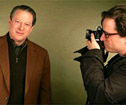 There does seem a sense in which the new environmentalism that began to gain fresh popular political weight in 2006 is taking on religious overtones (or is it undertones?). It is almost as if the agnostic forces of progress are trying to answer the religious right’s critique about the lack of spiritual depth in the free and democratic secular society. Like the aboriginal peoples of Canada in the primeval past (or native Americans in the lexicon of the USA), we will return to the old virtues of seeing a respectful interaction with the natural world around us as a key to our own species’ survival. The more hard-headed question which still remains for many is can this issue actually win or lose an election for anyone? Maybe we will get a bit closer to an answer in 2007? (In Canada at least: see no. 10 above.)
There does seem a sense in which the new environmentalism that began to gain fresh popular political weight in 2006 is taking on religious overtones (or is it undertones?). It is almost as if the agnostic forces of progress are trying to answer the religious right’s critique about the lack of spiritual depth in the free and democratic secular society. Like the aboriginal peoples of Canada in the primeval past (or native Americans in the lexicon of the USA), we will return to the old virtues of seeing a respectful interaction with the natural world around us as a key to our own species’ survival. The more hard-headed question which still remains for many is can this issue actually win or lose an election for anyone? Maybe we will get a bit closer to an answer in 2007? (In Canada at least: see no. 10 above.)
5. The Sadness of Britney Spears (and Paris Hilton and Lindsay Lohan- and the Happiness of Beyonc Knowles) … In the global anglophone mass culture universe currently headquartered in Southern California, the long hot summer of 2006 brought us Paris Hilton’s “debut single” video – a cute seasonal tune called Stars Are Blind.’ (And who will soon forget the wayward hotel heiress bursting into colour, with  her long blond hair and tanned body parts moving wildly in the sun, as she sang “You know the gods are crazy / You know the stars are blind / You show me real love baby / I’ll show you mine.”)
her long blond hair and tanned body parts moving wildly in the sun, as she sang “You know the gods are crazy / You know the stars are blind / You show me real love baby / I’ll show you mine.”)
As the year wore on, our hearts went out again to former teen-queen diva Britney Spears, as she struggled to adapt to life without K-Fed (?), and the logistical challenges of her new $7.2 million house in Beverly Hills, with its “five bedrooms, six bathrooms, swimming pool, library, media room and a terrace offering amazing views of Los Angeles.” Meanwhile, Beyonc Knowles showed why she was the class-act media femme fatale of 2006 very late in the year, on David Letterman’s TV show, promoting the new movie about Motown in the 1960s, Dreamgirls. (And Lindsay Lohan apparently thinks that both Bill Clinton and Al Gore can help resolve her unique inner struggles. And who knows? Maybe they can.)
4. Home-grown terrorism in Canada and all that … Back in June 2006 something called the “Canada terror plot” in some parts of the international media prompted even the progressive New Republic magazine in the United States to warn that though Canadians still “seem largely unconcerned about the threat of Islamic radicalism,”  Canada today “may actually be a haven for terrorist cells.” And even some Canadians started to wonder just how much of this could possibly be even half-true?
Canada today “may actually be a haven for terrorist cells.” And even some Canadians started to wonder just how much of this could possibly be even half-true?
It does turn out that Canada has about four times as many Muslims “per capita” as the USA today – as well as a slightly higher percentage of self-confessed Christians. But as 2006 ends the jury remains out on just what the alleged (and sometimes very young) Islamic extremists arrested in Ontario in June really amount too. And for many Canadians no doubt the thought that Canada is in any way a  more dangerous or less safe place than the United States seems to defy common sense, as well as years of ordinary experience on both sides of the (as yet) unfortified border.
more dangerous or less safe place than the United States seems to defy common sense, as well as years of ordinary experience on both sides of the (as yet) unfortified border.
But certain perceptions nonetheless haunt the American popular imagination. Thus the Globe and Mail reported as recently as December 22, 2006, in connection with the case of Maher Arar, on the “persistent view, not least among some in Congress, that decades of lax immigration rules turned Canada into a haven for Islamic extremists. The breaking, earlier this year, of an alleged Islamic terrorist group in Canada and lingering memories of Ahmed Ressam, the al-Qaeda millennium bomber who was thwarted by U.S. border agents after Canadian counterterrorism agents completely lost track of him, reinforce the view that Canadian anti-terrorist standards aren’t entirely reliable.”
3. The defeat of “universalistic nationalism” in the USA today? The most optimistic liberal or progressive view of what happily went down to at least a defeat of sorts in the November 7 US mid-term elections of 2006 may be reflected in a piece by the Yale historian Edmund S. Morgan, in the November 16 issue of the New York Review of Books. The piece reviewed Robert Kagan’s new book Dangerous Nation, which tells the story of the growth of “universalistic nationalism” in the USA, from the later 18th to the end of the 19th centuries.
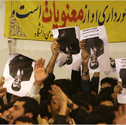 As Morgan urged, “it is difficult not to read Dangerous Nation as historical justification for present positions” – of those who contend that Americans “have always gone out into the world to remake it in their own image” (and for what they have always claimed to see as such very good reasons as a “sincere commitment to human rights”). This is no doubt the same kind of moral high ground on which George W. Bush has come to stake his claims about his policy in Iraq. And if it is true that the American people more or less decisively turned their backs on this policy on November 7, then Kagan’s “universalistic nationalism” is arguably enough what ultimately went down to defeat in the US mid-term elections of 2006.
As Morgan urged, “it is difficult not to read Dangerous Nation as historical justification for present positions” – of those who contend that Americans “have always gone out into the world to remake it in their own image” (and for what they have always claimed to see as such very good reasons as a “sincere commitment to human rights”). This is no doubt the same kind of moral high ground on which George W. Bush has come to stake his claims about his policy in Iraq. And if it is true that the American people more or less decisively turned their backs on this policy on November 7, then Kagan’s “universalistic nationalism” is arguably enough what ultimately went down to defeat in the US mid-term elections of 2006.
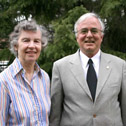 Always fascinated (and of course much smaller) Canadian next-door neighbours of the USA today may take a somewhat different cut at the same syndrome. As Edmund S. Morgan himself says: “Universalistic nationalism is almost an oxymoron.” Back during an earlier US bout of the same historical condition, in the late 1940s and early 1950s, Harold Innis just talked about the “American imperialism” that “has been made plausible and attractive in part by the insistence that it is not imperialistic.” (And Innis noted too that this “Imperialism which is not imperialistic has been particularly effective in Canada with its difficulties in dealing precisely and directly with foreign problems because of division between French and English.”)
Always fascinated (and of course much smaller) Canadian next-door neighbours of the USA today may take a somewhat different cut at the same syndrome. As Edmund S. Morgan himself says: “Universalistic nationalism is almost an oxymoron.” Back during an earlier US bout of the same historical condition, in the late 1940s and early 1950s, Harold Innis just talked about the “American imperialism” that “has been made plausible and attractive in part by the insistence that it is not imperialistic.” (And Innis noted too that this “Imperialism which is not imperialistic has been particularly effective in Canada with its difficulties in dealing precisely and directly with foreign problems because of division between French and English.”)
From here it is only one more small step for mankind to the much more recent American “Empire Lite” not so long ago propagated by Michael Ignatieff, who has more recently again just become deputy leader of the Liberal Party of Canada (which featured Howard Dean as keynote speaker at its Montreal leadership convention earlier this month). And then, remember, it was the Democrats and not the Republicans who took America into Vietnam.
 To be very optimistic, maybe the Democrats did learn from Vietnam – and maybe finally the Republicans will take the same lesson from Iraq. Yet Canadians, many of whom still seem to have their own warm memories of the old British imperialism, may still wonder if November 7, 2006 really does mean the end of the American imperialism which is not imperialistic and is thus more like universalistic nationalism, and so forth. As Edmund Morgan shows in the November 16 New York Review of Books, universalistic nationalism, or whatever, is very far from everything in American history since 1776. But Robert Kagan no doubt continues to have a point of sorts too: it is a condition that has recurrently arisen in the American past.
To be very optimistic, maybe the Democrats did learn from Vietnam – and maybe finally the Republicans will take the same lesson from Iraq. Yet Canadians, many of whom still seem to have their own warm memories of the old British imperialism, may still wonder if November 7, 2006 really does mean the end of the American imperialism which is not imperialistic and is thus more like universalistic nationalism, and so forth. As Edmund Morgan shows in the November 16 New York Review of Books, universalistic nationalism, or whatever, is very far from everything in American history since 1776. But Robert Kagan no doubt continues to have a point of sorts too: it is a condition that has recurrently arisen in the American past.
(Or as Harold Innis also noted in the late 1940s: “The United States has been described by John Gunther as the greatest, craziest, most dangerous, least stable, most spectacular, least grown up and most powerful and magnificent nation ever known.’ Her attitude reminds one of the fanatic fear of mice shown by elephants.”)
2. Isolationism and the current bubbles of Canada … Both Edmund Morgan and Robert Kagan seem to agree that some old doctrine of US universalistic nationalism helps explain why, early on, the “leaders of the new republic, almost to a man, expected that the day would come when the United States would stretch across the entire expanse of the continent, not only westward but also northward into Canada and southward into Mexico … and perhaps Cuba, as well.'”
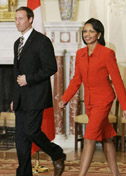 Exactly 230 years after the Declaration of Independence this has still not happened – yet. And historians like Edmund Morgan might reasonably say that this is just one more example of how universalistic nationalism has been just a recurrent condition, and not any kind of guiding main principle, in the progress of the USA. The model of democracy in America, at its best and most brilliant, has been far too diversely individualistic and egalitarian to finally impose any established order of its own, even on the only somewhat different and often intermingled histories of the other lesser new-world political experiments on its immediate borders by land. And so neither Canada nor Mexico has supported the US war in Iraq, 2003-200? – without really suffering in any serious way at all (and just like what is now, it seems, a clear enough majority in the United States itself).
Exactly 230 years after the Declaration of Independence this has still not happened – yet. And historians like Edmund Morgan might reasonably say that this is just one more example of how universalistic nationalism has been just a recurrent condition, and not any kind of guiding main principle, in the progress of the USA. The model of democracy in America, at its best and most brilliant, has been far too diversely individualistic and egalitarian to finally impose any established order of its own, even on the only somewhat different and often intermingled histories of the other lesser new-world political experiments on its immediate borders by land. And so neither Canada nor Mexico has supported the US war in Iraq, 2003-200? – without really suffering in any serious way at all (and just like what is now, it seems, a clear enough majority in the United States itself).
Ironically enough, as well, the latest bout of US universalistic nationalism has prompted a new inwardness inside the American elephant. So on the one hand there is the fence of some sort that is supposed to be built between Mexico and the USA (by Mexicans of course, as some California TV comedians have already begun to aptly enough point out), to keep out illegal Mexican immigrants to the American economic dream. And, on the other, Canadians will soon need passports to travel to the USA (as will Americans in Canada, who travel back). And the current US ambassador to Canada is just saying, in effect, get used to it. (Even if it does sound quite absurd to anyone who grew up in Canada in the 1950s, when you didn’t need any kind of documents at all – you just had to say verbally you were born in Canada and going on a shopping trip, and the border officials would say something like “have a good time in the USA.”)
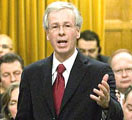 On the northern border, all this seems to have had a parallel inward-turning effect on Canada itself. The place has some domestic problems of its own that need some kind of sorting around, at last, and apparently. And in the elections of both 2004 and 2006 the sovereign Canadian people seem to have been telling their political leaders that it’s time to worry a bit more about all the gathering bubbles at home, and a bit less about the wider global village, and so forth.
On the northern border, all this seems to have had a parallel inward-turning effect on Canada itself. The place has some domestic problems of its own that need some kind of sorting around, at last, and apparently. And in the elections of both 2004 and 2006 the sovereign Canadian people seem to have been telling their political leaders that it’s time to worry a bit more about all the gathering bubbles at home, and a bit less about the wider global village, and so forth.
The always interesting John Ibbitson of the Toronto Globe and Mail came at this issue from a somewhat different but still intriguing angle, in his column for December 19, 2006. A US foreign policy bureaucrat “over a glass of wine” recently asked Mr. Ibbitson “a simple question: Where has Canada gone?'” Strangely enough, some people in both the USA and in Europe have actually lately been saying that any clear message from Canada is being missed in the global councils. And Mr. Ibbitson has done his best to explain:
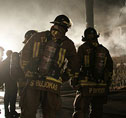 “Nothing is going to improve soon. The enduring presence of the Bloc Qubcois, the weakness of the Liberal Party in Western Canada and rural Ontario, and the equivalent weakness of the Conservative Party in the three big cities leave little hope for a future majority government, which is why responsible politicians would work to ensure that minority Parliaments last, at the least, two years … Instead, this year’s crop of opposition leaders is openly conspiring to force an election, while the Tories continue to search for a breakthrough strategy in Quebec and urban Ontario … Unless Canadians can find a way to elect a majority government, we may have to shift to proportional representation to elect the House of Commons, in hopes of creating stable coalitions … Until then, the world will get less Canada.”
“Nothing is going to improve soon. The enduring presence of the Bloc Qubcois, the weakness of the Liberal Party in Western Canada and rural Ontario, and the equivalent weakness of the Conservative Party in the three big cities leave little hope for a future majority government, which is why responsible politicians would work to ensure that minority Parliaments last, at the least, two years … Instead, this year’s crop of opposition leaders is openly conspiring to force an election, while the Tories continue to search for a breakthrough strategy in Quebec and urban Ontario … Unless Canadians can find a way to elect a majority government, we may have to shift to proportional representation to elect the House of Commons, in hopes of creating stable coalitions … Until then, the world will get less Canada.”
Well … you might also think that John Ibbitson would be happy enough if we just did elect a Stephen Harper majority government to solve the problem. And we certainly hope this doesn’t somehow happen in 2007, or 2008, and beyond. Shifting “to proportional representation to elect the House of Commons, in hopes of creating stable coalitions” would be better than that. The trouble is you can get a majority of seats in  Parliament with no more than 40% of the popular vote now. And that kind of majority government doesn’t really work any longer either – whether it’s Liberal or Conservative. It would be better if the politicians worked more seriously at “creating stable coalitions.”
Parliament with no more than 40% of the popular vote now. And that kind of majority government doesn’t really work any longer either – whether it’s Liberal or Conservative. It would be better if the politicians worked more seriously at “creating stable coalitions.”
That at least does seem to be what the various Canadian people in their collective wisdom have said in both 2004 and 2006. And, right now, it may actually be the best way of moving the country ahead, more or less the way someone like Harold Innis might want, at last. And, in any case, for the moment it still looks quite unlikely that the United States finally will “stretch across the entire expanse of the continent, not only westward but also northward into Canada and southward into Mexico … and perhaps Cuba, as well.” (That, some would say, remains Canada’s – and Mexico’s and Cuba’s – greatest gift to both the global village and the USA itself today.)
1. BABY IT’S YOU … Meanwhile, to top everything else about the year 2006 in this part of the world off altogether, if you ever do wonder whether the USA today, in spite of everything else, still has what it takes to be the greatest, craziest, most dangerous, least stable, most spectacular, least grown up and most powerful and magnificent nation ever known,’ check out Time magazine’s “Person of the Year” 2006 on its home turf (and not just the Canadian newsmaker of the year in Time Canada’s local edition):
 And if you have actually read to the end of this all too long year-end counterweights editors blog for 2006, this message is especially for you. You and us and all of us who travel in cyberspace to expand our hearts and minds seem to be exactly who the editors of Time magazine have in mind, as persons of the year whose end is now only days away. (And, arguably enough, we may also be somehow reviving and renewing Harold Innis’s much-admired ancient “oral tradition” in global communications, for who knows what other vast pioneering bold purposes in the new age of the Internet, etc, etc.) So, whatever other appalling things may have happened to you, it must somehow have been a pretty good year. And there must still be many more ahead yet. Many more struggles no doubt lie ahead as well. But there is now a little more hope that the bad guys are not going to win them all … Happy New Year, wherever you are, on Planet Earth, 2007!
And if you have actually read to the end of this all too long year-end counterweights editors blog for 2006, this message is especially for you. You and us and all of us who travel in cyberspace to expand our hearts and minds seem to be exactly who the editors of Time magazine have in mind, as persons of the year whose end is now only days away. (And, arguably enough, we may also be somehow reviving and renewing Harold Innis’s much-admired ancient “oral tradition” in global communications, for who knows what other vast pioneering bold purposes in the new age of the Internet, etc, etc.) So, whatever other appalling things may have happened to you, it must somehow have been a pretty good year. And there must still be many more ahead yet. Many more struggles no doubt lie ahead as well. But there is now a little more hope that the bad guys are not going to win them all … Happy New Year, wherever you are, on Planet Earth, 2007!
